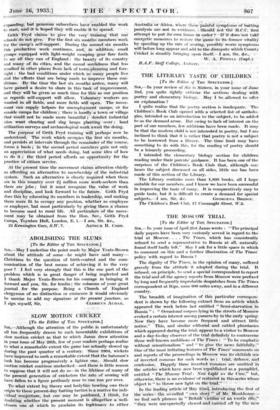TIIE MOSCOW TRIAL [To the Editor of THE SPECTATOR.] .
Sea,—In your issue of April 21st Janus wrote : "The principal daily papers have been very variously served in regard to the trial at Moscow. . . . The Times, which has consistently refused to send a representative to Russia at -all, naturally found itself badly left." May I ask for a little space in which to comment on this and a further illustration of The Times' policy with regard to Russia ? .
The dignity of The Times, in: the opinion of many, suffered gravely from the attitude it adopted during the trial. It refused, on principle, to send a• special correspondent to report the trial and all the agency reports from Moscow were' prefixed by long and frequently improbable despatches from The Tithes correspondent at Riga, some 600 miles away, and in a different country. .
The breadth of imagination of' this particular correspon- dent is shown by the following extract from an article which appeared the week before last entitled " Semi-starvation in 'Russia " : " Occasional corpses lying in the streets of Moscow evoked a certain interest among passers-by in the early spring. Now they have become more frequent and attract little notice." This, and similar editorial and cabled phantasies which appeared-during the trial; appear to a visitor to Moscow and a day-tordaY observer of the trial definitely to contravene those well-known ambitions of The Times : " To be emphatic without sensationalism" and " to give the news faithfully." One of the most irritating features of The Times' comments on and reports of the proceedings in Moscow was its-Childish use of inverted commas for such words as.: trial, defence; and ,confession.. Happily these inverted commas are omitted in tyre articles which have now been' republished HS. ft pamphlet, . entitled "The Moscow Trial : New Light on the Case," but, otherwise, there is no 'evidence of restraint in this series whose object is." to throw new light on the trial." • • " In the 10ditig'artiele of May 22nd, introducing the first of the 'series:-"-the sb'-called oWn story " Of Mr. Monkhouse- we find such phrases as " Britildi'victifils `of an 'exotic rite," "they were unexpectedly clawed and carried off by the new Inquisition," " stories of guilt obligingly composed for the prisoners " and other remarks of a nature hardly calculated to hasten the release of the two British engineers now in the Sokolniki prison. " Mr. Monkhouse's Own Story," contain- ing only some 25 lines of reported speech, is interesting for the reiteration by Mr. Monkhouse of the allegation that he was cross-examined by the OGPU for 19 hours and that he received no preferential treatment. The mystery why Mr. Monkhouse retracted this allegation in court, when confronted with records from the Libuianka, although he must have realized that he thus placed his Government in a most embar- rassing position, is not referred to by The Times. The " Special Correspondent " responsible for these articles airily dismisses the central mystery in a mysterious case with the words :
" To most people the distinction between 19, 18, or even 12 houAs of continuous cross-examination will appear a distinction with hardly a difference."
The second article, " Mr. Cushny and the OGPU," contains a balanced account by Mr. Cushny of this engineer's experi- ences before the trial. There seems no doubt that a good deal of threat and counter-threat was used by the OGPU in extracting confessions from these men, and the fight Mr. Cushny put up, recounted in his own words, makes one of the most interesting and significant documents published since the case began.
The third article is devoted to " Light on the Confessions:" In which The Times special correspondent skirts round the question of why Mr. Thornton and Mr. Macdonald, having signed written confessions which, according to The Times, were without foundation, should not have retracted them in much more definite terms during the proceedings when the prisoners knew that they had the backing of their firm and of their Government. That, to the mind of an observer of the trial, was absolutely incomprehensible. Admitted that these con- fessions were signed under moral pressure ; admitted that the prisoners were anxious not to render the position of Mr. Macdonald even more precarious, it is yet almost incredible that they were not advised through the embassy by their Government and through Mr. Turner by Metro-Vickers to get up and, in plain English, one after the other, to denounce the trial as a " frame-up" and the accusations as absurd and un- founded. But, although these were men with - sufficient experience of Soviet affairs to know that a foreigner has never received the death sentence as the outcome of a show trial in the U.S.S.R., they never attempted to make unretracted, open declarations, although the Press in Moscow was con- tinually urging them to do so and was prepared to break all censorship rules to get such statements out to the world. This mystery is never touched upon in The Times articles, which therefore appear to fail in their avowed object of disclosing the " birth " about the trial.
In the fourth and last article-of the series, entitled " Cramp- big the Defence," The Times special correspondent mentions that " There was no attempt to draw a connected and con- vincing story from the English accused." That the prisoners never attempted to provide one for themselves is, I suggest, the real reason why the ultimate verdict of the British public on the recent proceedings in Moscow must remain open until a great deal more " light " is thrown on the trial than these articles succeed in throwing.—I am, Sir, &c., EYE-WITNESS.











































 Previous page
Previous page